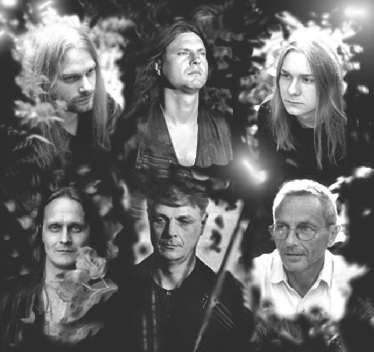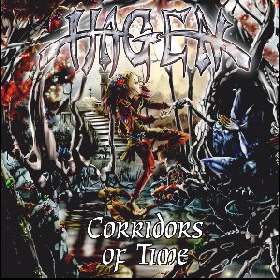Interview

(Progressive Newsletter Nr.36 07/01)
excerpts from an interview with Hans Rosén (Bass), Hans Lundin (Keyboards), Michael Ohlsson (Vocals), Per Nilsson (Guitars)
Hans R.: My brother Anders and I have been musicians for a long time but in different music areas, Anders is a folk musician and Iím into hard and heavy rock and progressive music. When Anders moved to Yttermalung, a place in Dalarna from which we both origin we started to spend more time together. Of course, when two musicians meet, thereís a lot of music in the air. We started making songs and recorded them on a computer allowing a maximum of four audio channels and a MIDI connection to a Kurzweil synthesiser that gave us a drum set. The recordings we made consisted of electric violin, bass guitar, drum machine - sometimes played live from the keyboard - and also some chords on the keyboard here and there. Most of the basic structures to the songs of the album were made in this period. At this period we had started to thinking about the possibilities to getting it further. One night, a friend of mine, an owner of a hard rock bar had been talking about a great guitar player who was something special. Well, we got in contact and got Per as our guitar player. The drummer is an important part of a band. I discussed the matter with Per and he was the one connecting us to Patrik. At this time Anders and I had been thinking about possible keyboard players. One of my favourites has always been Hans Lundin of Kaipa, I always played these albums wherever we was, in the car or at home. I mentioned his name for Anders as our possible keyboard player. We came to the conclusion, why not give him a call and send him the demo if he finds what we say interesting. Anders was the one to make the call. After some talking it was agreed a demo should be sent, Iíve heard from Hans Lundin about his first reactions, but thatís up to him to tell about.
Hans L.: There have always been influences of Swedish folk music in my own compositions. When Anders asked me if I was interested to be a part of this project I saw it as a challenge, and something that could give me a lot of new experiences. I cannot say that the first demo was especially exiting. In my opinion there was too much of hard rock, but I was fascinated of all the beautiful melodies. From the beginning I did not realize that I was supposed to play along with Anders in many of the melodies. Sometimes they made me a little bit confused.
Michael: Since 1982 Hans Ros/eacute;n is a very good friend of mine and heís been playing the bass in almost every band Iíve fronted. Considering that, it was out of the question to say nothing but yes when he and his brother asked me to join Hagen.

You started back in 96. What has changed until then concerning the musical style of Hagen?
Hans R.: When you are new into something, for example a band, there is a lot of trying different ideas and experimenting. Itís a way to develop, trying to get further in a way thatís positive. At this moment we are discussing the recording of our next album and the songs for it. For me, it feels like my own song writing has developed in a way that will integrate folk and rock in a closer relationship. I think the years have brought us a new self-confidence. Itís not new to us anymore, weíre ready to take it a step further.
Michael: 1996, Hagen was a chaos of good instrumental ideas. Now itís a genuine musical style.
Your music is an interesting mixture of Hard Rock / Metal and Swedish folk music. Who had the idea of combining these two styles together and how do you manage to keep the right balance?
Hans R.: Well, concerning Hagen it was Anders and I. We had been musicians in different styles, Anders in folk and jazz music and I had been in different kinds of hard rock and blues bands. When we started to talk about doing something together the whole thing was obvious, Anders is a folk fiddler and Iím a hard rock bass player. Itís worth mentioning that Hans Lundin on keyboards made folk inspired music with the band Kaipa in the 70:s and 80:s and that vocalist Michael and I also mixed the styles in the band New Clear Daze in the 80:s. Also Anders had been doing crossover music mixing jazz and folk. So, it was really not new to us. You ask about how to keep the balance. I guess itís about song writing and arrangement. Every member in Hagen is an experienced musician, and by this I also mean experienced in composing and arranging. There is one more thing to remember, Swedish traditional music is a part of a Swedeís blood, just like the blues for a guy from the US south.
Michael: Combining folk music with other styles is nothing new. Itís the way we do it! The balance comes natural with our personalities.
Is the contrast in the music between "beauty and the beast" also a reflection of the different personalities in the band?
Hans R.: I donít think so, never heard our music that way. In a band, there are always different personalities. Thatís one of the important things to stay creative. In some bands this environment goes the wrong way, but if you have respect for your partners, it will gain you.The music on the album reaches from slow, almost spiritual music to something near to hard core. But, in every song you can find beautiful melodies played by the violin, guitar or keyboard or sang by Michael. The accompaniment can sometimes be real wild and heavy. In other songs you can hear a thoughtful ballad. Itís dynamic, itís Hagen. Well, maybe it can be called ďthe beauty and the beastď, but in our case, I think the beast is our friend.
Michael: Weíre all beautiful beasts.
Per: I think that "Beauty and the beast", the melodic and the aggressive if you will, is present in all of our personal styles. Take Andersī playing for example, he covers the whole spectrum, from soft soaring melodies to furious polskas.

Is there a meaning in the band's name?
Hans R.: Hagen is actually a place in the small village Yttermalung form were my brother and I origins. The mountains and the woods surrounding the village can recognize the nature of the place. My brother and I come from a family called "Haga" in these parts of Sweden. The "Haga" family origins from a part in the village called Hagen in which our family has been living for ages. If youíre a "Haga", Hagen is youíre place. The band name came quite easy.
How long did it take to put your album together? And are you satisfied with the final result?
Hans R.: It took a while to do it. But, when do a band start and when do you start working on an album. For us, I think itís been a process no one really knew about when it was happening. We were in a state of creating with abilities and wishes to do something more. Iím very happy with the result. Every time I listen to the album I think, ďthis is real goodĒ.
Michael: 2000 years. Itís one of my favourite albums and thatís strange (ask any musician).
Per: Man, it took forever. When we went into the studio most of the songs werenīt finished, we had bits and pieces, a violin-melody here and a guitar-riff there. We recorded in Andersī studio which meant that we could enjoy the luxury of writing in the studio, as he didnīt charge by the hour... The recording process were sometimes painfully slow, we had technical problems that took considerable time to fix, but weīre all very happy with the result.
What are the reactions concerning the album so far?
Hans R.: Very good, weíve had our thoughts about how the reactions would be as our music is quite different, especially as a part of it is Swedish traditional folk music which I guess, is not so spread around the world. Writers outside Scandinavia have compared us to being a mix between Celtic music and different kinds of hard rock. Well, if you donít know it, you compare it to the next thing known by you. I really hope the readers will visit our website www.hagen.nu in which they can listen to the whole album and get an own opinion about it.
Kristian Selm © Progressive Newsletter 2001